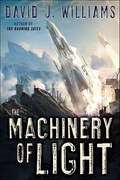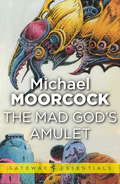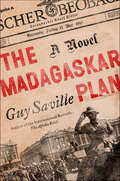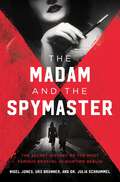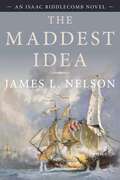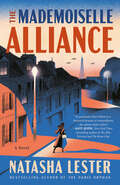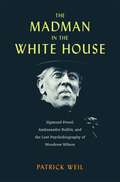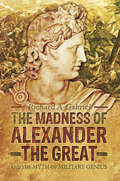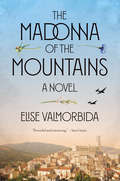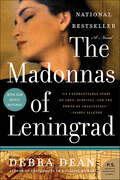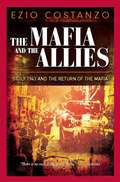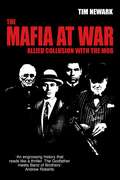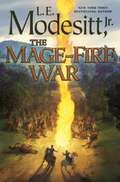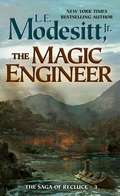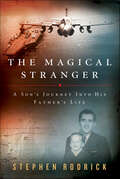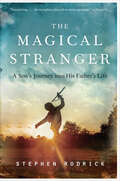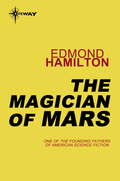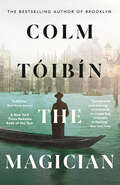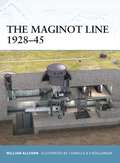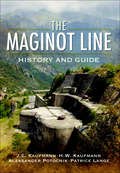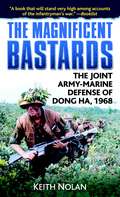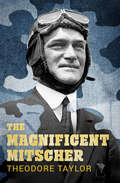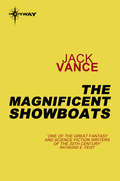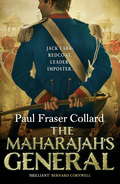- Table View
- List View
The Machinery of Light (Autumn Rain #3)
by David J. WilliamsWith The Machinery of Light, David J. Williams completes his furiously paced, stunningly imagined trilogy--a work of vision, beauty, and pulse-pounding futuristic action. September 26, 2110. 10:22 GMT. Following the assassination of the American president, the generals who have seized power initiate World War Three, launching a surprise attack against the Eurasian Coalition's forces throughout the Earth-Moon system. Across the orbits, tens of thousands of particle beams and lasers blast away at one another. The goal: crush the other side's weaponry, paving the way for nuclear bombardment of the cities. As inferno becomes Armageddon, the rogue commando unit Autumn Rain embarks on one last run. Matthew Sinclair, an imprisoned spymaster, plots his escape. And his former protege Claire Haskell, capable of hacking into both nets and minds, is realizing that all her powers may merely be playing into Sinclair's plans. For even as Claire evades the soldiers of East and West amid carnage in the lunar tunnels, the surviving members of the Rain converge upon the Moon, one step ahead of the Eurasian fleets but one step behind the mastermind who created Autumn Rain--and his terrible final secret.
The Mad God's Amulet: The Mad God's Amulet (Gateway Essentials #447)
by Michael MoorcockAfter withstanding the power of the Black Jewel and saving the city of Hamadan from the conquest of the Dark Empire of Granbretan, Hawkmoon set off for the Kamarg, where friendship and love await him. But the journey is beyond treacherous. With his boon companion, Oladahn, the beastman of the Bulgar Mountains, Hawkmoon discovers the peaceful city of Soryandum, which holds the power to transcend the confines of time and space. This power, which keeps the city from falling to the Dark Empire, could keep the Kamarg safe. But alas his love Yisselda is now a prisoner of the Mad God, whose powerful amulet is linked to Hawkmoon's ultimate destiny: a power that began at creation and calls heroes to arms throughout existence. Hawkmoon must rip this amulet from the neck of the Mad God if he hopes to save the Kamarg and free his friends and his one true love from the Dark Empire's relentless wrath.
The Madagaskar Plan: A Novel
by Guy SavilleGuy Saville's The Madagaskar Plan imagines a disturbing alternate history in which Nazi victory in World War II brings their "Final Solution" ever closerThe year is 1953. There is peace in Europe, but a victorious Germany consolidates power in Africa. The lynchpin to its final solution is Madagaskar. Hitler has ordered the resettlement of European Jews to the remote island.British forces conspire to incite colony-wide revolt, resting their hopes on the expertise of Reuben Salois, an escaped leader of Jewish resistance. Ex-mercenary Burton Cole scours the island for his wife and child. But as chaos descends and the Nazis brutally suppress the nascent insurrection, Cole must decide whether he is master of-or at the mercy of-history. The Madagaskar Plan is alternate history of the highest order, a thriller of terrifying scope based on the Nazis' actual plans prior to the Holocaust.
The Madam and the Spymaster: The Secret History of the Most Famous Brothel in Wartime Berlin
by Nigel Jones Urs Brunner Dr. Julia SchrammelThis extraordinary story of a high-class Berlin brothel—taken over by the Nazi secret service—is one of the last untold tales of World War II. There is no book in English about the wartime Berlin &‘salon&’ run by Kitty Schmidt under the secret control of Reinhard Heydrich, one of the architects of the Final Solution. "Salon Kitty" was the most notorious brothel in the decadent Berlin of the Weimar Republic - the city of "Cabaret." But after the Nazis took power, it became something more dangerous: a spying center with every room wired for sound, staffed by female agents specially selected by the SS to coax secrets from their VIP clients. Masterminded by Reinhard Heydrich, the spymaster whom Hitler himself called "the man with the iron heart," the exclusive establishment turned listening post was patronized by the Nazi leaders themselves, not knowing that hidden ears were listening. The Madam and the Spymaster reveals the sensational true story of this forgotten part of espionage history. The deep research undertaken by Nigel Jones, Urs Brunner and Dr Julia Schrammel sheds new light on Nazi methods of control and coercion, and the way sex was abused for their own perverse purposes.
The Maddest Idea: An Isaac Biddlecomb Novel (Isaac Biddlecomb Novels)
by James L. NelsonIn the late summer of 1775, General George Washington discovers that his cache of gunpowder has dwindled to a mere nine shots per man. A desperate plan is hatched—to send a ship under the command of Captain Isaac Biddlecomb to Bermuda to capture the British powder known to be there. But the plan is a trap, set by a traitor among the patriots, and one from which even Biddlecomb cannot escape. Washington dispatches his aide-de-camp, Major Edward Fitzgerald, to hunt the traitor down, while Biddlecomb must rely on cunning and seamanship to free his men and the ship, and to capture the gunpowder that is the lifeblood of the fight for liberty.Divided by an ocean but bound by the cause, as well as by their own private fears, Biddlecomb and Fitzgerald must take on a common enemy—the greatest military power on earth.This is a powerful saga of the American Revolution—a stirring maritime adventure in the epic, true-to-life tradition of Patrick O&’Brian.
The Mademoiselle Alliance: A Novel
by Natasha LesterHow did a young Parisian mother, celebrated for her beauty and glamour, come to lead the largest spy network in occupied France?&“A passionate, fiery tribute to a historical woman so extraordinary she almost defies belief.&”—Kate Quinn, New York Times bestselling author of The Alice Network and The Briar ClubMorocco, 1928. Marie-Madeleine Méric is not the kind of woman who stays quietly at her husband&’s side. Polyglot, pianist, and pilot, she is a woman of many skills, with unconventional interests—like driving in car rallies—that earn her a daredevil reputation. But dabbling in intelligence work to assist her military officer husband and the French government helps her recognize who she is at heart: an adventurer. Paris, 1936. As Europe teeters on the brink of war, Marie-Madeleine is living in France, her marriage now in shambles, when a chance encounter with an enigmatic spy turns her life upside down. He recruits her to help build a resistance network, and she conceals her identity—and gender—as she navigates a perilous double life.Eventually, she steps into the role of leader of what is now known as Alliance, despite the naysayers who doubt in a woman&’s ability to do so. Capture and death are only a heartbeat away for both Marie-Madeleine and the agents under her care. At the helm of Alliance, she achieves seemingly impossible feats of espionage that help turn the tide of the war. But the most impossible, and dangerous, feat of them all? Falling in love. New York Times bestselling author Natasha Lester beautifully brings Marie-Madeleine Méric Fourcade&’s story to life in this powerful, heartbreaking tale of resilience that reminds us what it means to cherish those we love and fight for them with every breath.
The Madman in the White House: Sigmund Freud, Ambassador Bullitt, and the Lost Psychobiography of Woodrow Wilson
by Patrick Weil“A rich study of the role of personal psychology in the shaping of the new global order after World War I. So long as so much political power is concentrated in one human mind, we are all at the mercy of the next madman in the White House.”—Gary J. Bass, author of The Blood TelegramThe notorious psychobiography of Woodrow Wilson, rediscovered nearly a century after it was written by Sigmund Freud and US diplomat William C. Bullitt, sheds new light on how the mental health of a controversial American president shaped world events.When the fate of millions rests on the decisions of a mentally compromised leader, what can one person do? Disillusioned by President Woodrow Wilson’s destructive and irrational handling of the 1919 Treaty of Versailles, a US diplomat named William C. Bullitt asked this very question. With the help of his friend Sigmund Freud, Bullitt set out to write a psychological analysis of the president. He gathered material from personal archives and interviewed members of Wilson’s inner circle. In The Madman in the White House, Patrick Weil resurrects this forgotten portrait of a troubled president.After two years of collaboration, Bullitt and Freud signed off on a manuscript in April 1932. But the book was not published until 1966, nearly thirty years after Freud’s death and only months before Bullitt’s. The published edition was heavily redacted, and by the time it was released, the mystique of psychoanalysis had waned in popular culture and Wilson’s legacy was unassailable. The psychological study was panned by critics, and Freud’s descendants denied his involvement in the project.For nearly a century, the mysterious, original Bullitt and Freud manuscript remained hidden from the public. Then in 2014, while browsing the archives of Yale University, Weil happened upon the text. Based on his reading of the 1932 manuscript, Weil examines the significance of Bullitt and Freud’s findings and offers a major reassessment of the notorious psychobiography. The result is a powerful warning about the influence a single unbalanced personality can have on the course of history.
The Madness of Alexander the Great: And the Myth of Military Genius
by Richard A. GabrielOver the years, some 20,000 books and articles have been written about Alexander the Great, the vast majority hailing him as possibly the greatest general that ever lived. Richard A. Gabriel, however, argues that, while Alexander was clearly a succesful soldier-adventurer, the evidence of real greatness is simply not there. The author presents Alexander as a misfit within his own warrior society, attempting to overcompensate. Thoroughly insecure and unstable, he was given to episodes of uncontrollable rage and committed brutal atrocities that would today have him vilified as a monstrous psychopath. The author believes some of his worst excesses may have been due to what we now call Post Traumatic Stress Disorder, of which he displays many of the classic symptoms, brought on by extended exposure to violence and danger. Above all the author thinks that Alexander's military ability has been flattered by History. Alexander was tactically competent but contributed nothing truly original, while his strategy was often flawed and distorted by his obsession with personal glory. This radical reappraisal is certain to provoke debate.
The Madonna of the Mountains: A Novel
by Elise Valmorbida“A riveting adventure for the soul . . . just the kind of evocative historical fiction I love.”—Sara Gruen, author of At the Water’s Edge and Water for ElephantsAn epic, inspiring novel about one woman’s survival in the hardscrabble Italian countryside and her determination to protect her family throughout the Second World War—by any means possible Maria Vittoria is twenty-five when her father brings home the man who will become her husband. It is 1923 in the austere Italian mountain village where her family has lived for generations, and the man she sees is tall and handsome and has survived the First World War without any noticeable scars. Taking just the linens she has sewn that make up her dowry and a statue of the Madonna that sits by her bedside, Maria leaves the only life she has ever known to begin a family. But her future will not be what she imagines. The Madonna of the Mountains follows Maria over the next three decades, as she moves to the town where she and her husband become shopkeepers, through the birth of their five children, through the hardships and cruelties of the National Fascist Party Rule and the Second World War. Struggling with the cost of survival at a time when food is scarce and allegiances are questioned, Maria trusts no one and fears everyone—her Fascist cousin, the madwoman from her childhood, her watchful neighbors, the Nazis and the Partisans who show up hungry at her door. As Maria’s children grow up and her marriage endures its own hardships, she must hold her family together with resilience, love, and faith, until she makes a fateful decision that will change the course of all their lives. A sweeping saga about womanhood, loyalty, war, religion, family, food, motherhood, and marriage, The Madonna of the Mountains is a poignant look at the span of one woman’s life as the rules change and her world becomes unrecognizable. In depicting the great cost of war and the ineluctable power of time on a life, Elise Valmorbida has created an unforgettable portrait of a woman navigating both the unforeseen and the inevitable.Advance praise for Madonna of the Mountains“The moral and ethical questions raised propel the story beyond the particulars into the universal.”—Kirkus Reviews“It is a bewitching but entirely unsentimental portrait of one woman’s attempt to keep her family safe in turbulent times.”—The Times (UK), Book of the Month“A solid choice for readers who appreciate layered family sagas.”—Library Journal
The Madonnas of Leningrad: A Novel
by Debra Dean“An unforgettable story of love, survival and the power of imagination in the most tragic circumstances. Elegant and poetic.” —Isabel Allende, New York Times bestselling author of ZorroThe ravages of age are eroding Marina's grip on the everyday. An elderly Russian woman now living in America, she cannot hold on to fresh memories—the details of her grown children's lives, the approaching wedding of her grandchild—yet her distant past is miraculously preserved in her mind's eye.Vivid images of her youth in war-torn Leningrad arise unbidden, carrying her back to the terrible fall of 1941, when she was a tour guide at the Hermitage Museum and the German army's approach signaled the beginning of what would be a long, torturous siege on the city. As the people braved starvation, bitter cold, and a relentless German onslaught, Marina joined other staff members in removing the museum's priceless masterpieces for safekeeping. As the Luftwaffe's bombs pounded the proud, stricken city, Marina built a personal Hermitage in her mind—a refuge that would stay buried deep within her, until she needed it once more. . . .“Extraordinary. . . . Dean’s exquisite prose shimmers . . . illuminating us to the notion that art itself is perhaps our most necessary nourishment.” —Chang-Rae Lee, New York Times bestselling author of Aloft and Native Speaker“A poignant tale.” —Booklist, starred review“Dean writes with passion and compelling drama.” —People“Rare is the novel that creates that blissful forgot-you-were-reading experience . . . but that is precisely what Debra Dean has achieved with her image-rich book.” —Seattle Post-Intelligencer“Poetic.” —San Francisco Chronicle Book Review“[A] heartfelt debut.” —New York Times Book Review“Remarkable”— NPR, Nancy Pearl Book Review
The Mafia and the Allies
by George Lawrence Ezio CostanzoWithin weeks of the Pearl Harbor attack and the declaration of war on the United States by Germany and Italy, US war plans included the defense of the East Coast and the invasion of Sicily. Here, Ezio Costanzo examines the many elements of this secret scenario, which included long-suppressed information about cooperation between the Mafia and the US Army. The results came in the aftermath of the invasion, during the new military government that gave many Mafia leaders important administrative positions. Seen from an Italian standpoint, the success of US forces is examined in detail and many questions are finally answered.
The Mafia at War: Allied Collusion with the Mob
by Tim NewarkThe Mafia is the most powerful criminal organisation the world has ever known. This book tells the epic story of how the Mafia was nearly destroyed by Mussolini, prospered in the US, struck a secret wartime deal with the US government, and then backed a bloody rebellion that nearly turned Sicily into an independent Mafia realm. It shows how Lucky Luciano won his freedom thanks to mobster help in WWII; how Jewish gangsters clashed with Nazis on the streets of New York; how Mafiosi nearly issued contracts to kill top Nazis including Hitler; how British bobbies patrolled the deadly streets of Palermo; and how Mafia-backed bandits conducted a guerrilla war for Sicilian independence.The Mafia at War is a provocative account of how a criminal organisation exploited the grim realities of World War II to revive its fortunes and dominate global crime. 'A fascinating and compelling work on three of the most evil movements of the 20th century. It ought to be required reading for anyone looking for insights into the period.' Richard Hammer
The Mage-Fire War (Saga of Recluce #21)
by L. ModesittL. E. Modesitt, Jr., continues his bestselling Saga of Recluce with The Mage-Fire War, the third book in a story arc which began with The Mongrel Mage and Outcasts of Order. A USA Today Bestseller!Once again, prejudices against the use of chaos magic force Beltur and his companions to flee their refuge in Axalt. The rulers of nearby Montgren have offered them sanctuary and the opportunity to become the Councilors of the run-down and disintegrating town of Haven.Montegren lacks any mages—white or black—making this seem like the perfect opportunity to start again.However, Beltur and the others must reinstitute law and order, rebuild parts of the town, deal with brigands—and thwart an invading army.At the Publisher's request, this title is being sold without Digital Rights Management Software (DRM) applied.
The Magic Engineer: The Towers Of The Sunset, The White Order, The Magic Engineer, Colors Of Chaos (Saga Of Recluce Ser. #3)
by L. E. Modesitt Jr."An intriguing fantasy in a fascinating world." —Robert Jordan, New York Times Bestselling author of The Wheel of Time® seriesDorrin, a young scion of the Order magicians, is interested in forbidden knowledge, in the working of machines. Promising, intelligent, but determined to follow his passion for scientific knowledge, Dorrin can invent machines. He is the Leonardo da Vinci of his age, but his insights violate the rules of the Order magic of Recluce. Now he must go into exile in the lands of Chaos to pursue his dangerous inventions.Yet Dorrin remains loyal to the idea of Order, and is tortured by the knowledge that to preserve it he must constantly create new devices for war. For the forces of the Chaos wizards are moving across the land, devouring whole countries and creating an empire—and their ultimate goal is the destruction of Recluce.L.E. Modesitt, Jr.'s bestselling fantasy novels set in the magical world of Recluce are among the most popular in contemporary fantasy. Each novel tells an independent story that nevertheless reverberates though all the other books in the series, to deepen and enhance the reading experience. Rich in detail, the Recluce books are a feast of wondrous marvels.Saga of Recluce#1 The Magic of Recluce / #2 The Towers of Sunset / #3 The Magic Engineer / #4 The Order War / #5 The Death of Chaos / #6 Fall of Angels / #7 The Chaos Balance / #8 The White Order / #9 Colors of Chaos / #10 Magi’i of Cyador / #11 Scion of Cyador / #12 Wellspring of Chaos / #13 Ordermaster / #14 Natural Order Mage / #15 Mage-Guard of Hamor / #16 Arms-Commander / #17 Cyador’s Heirs / #18 Heritage of Cyador /#19 The Mongrel Mage (forthcoming)Story Collection: Recluce TalesOther Series by L.E. Modesitt, Jr.The Imager PortfolioThe Corean ChroniclesThe Spellsong CycleThe Ghost BooksThe Ecolitan MatterAt the Publisher's request, this title is being sold without Digital Rights Management Software (DRM) applied.
The Magical Stranger: A Son's Journey into His Father's Life
by Stephen RodrickThe Magical Stranger is a moving story of love and sacrifice, fathers and sons, heroism and duty, soldiers and the families they leave behind.On November 28, 1979, squadron commander and Navy pilot Peter Rodrick died when his plane crashed in the Indian Ocean, leaving behind a devastated wife, two daughters, and a 13-year-old son.In this powerful, beautifully written book, journalist Stephen Rodrick explores the life and death of the man who indelibly shaped his life, even as he remained a mystery. Through adolescence and into adulthood, Stephen Rodrick struggled to fully grasp the reality of his father’s death and its permanence.To better understand his father, Rodrick turned to members of his father’s former squadron, the "World-Famous Black Ravens." As he learns about his father, he uncovers the layers of these sailors’ lives: their loves, friendships, dreams, disappointments—and the consequences of their choices on those they leave behind. The journey doesn’t end until November 28, 2013, when Rodrick’s first son is born 34 years to the day after his father’s mishap.A penetrating, thoughtful blend of memoir and reportage, The Magical Stranger is a moving reflection on the meaning of military service and the power of a father’s legacy.
The Magical Stranger: A Son's Journey into His Father's Life
by Stephen RodrickOn November 28, 1979, squadron commander and Navy pilot Peter Rodrick died when his plane crashed in the Indian Ocean. He was just thirty-six and had been the commanding officer of his squadron for 127 days. Eight thousand miles away on Whidbey Island, near Seattle, he left behind a grief-stricken wife, two daughters, and a thirteenyear-old son who would grow up to be a writer—one who was drawn, perhaps inevitably, to write about his father, his family, and the devastating consequences of military service.In The Magical Stranger, Stephen Rodrick explores the life and death of the man who indelibly shaped his life, even as he remained a mystery: brilliant but unknowable, sacred but absent—an apparition gone 200 days of the year for much of his young son's life—a born leader who gave his son little direction. Through adolescence and into adulthood, Rodrick struggled to grasp fully the reality of his father's death and its permanence. Peter's picture and memory haunted the family home, but his name was rarely mentioned.To better understand his father and his own experience growing up without him, Rodrick turned to today's members of his father's former squadron, spending nearly two years with VAQ-135, the "World-Famous Black Ravens." His travels take him around the world, from Okinawa and Hawaii to Bahrain and the Persian Gulf—but always back to Whidbey Island, the setting of his family's own story. As he learns more about his father, he also uncovers the layers of these sailors' lives: their brides and girlfriends, friendships, dreams, disappointments—and the consequences of their choices on those they leave behind.A penetrating, thoughtful blend of memoir and reportage, The Magical Stranger is a moving reflection on the meaning of service and the power of a father's legacy.
The Magician of Mars
by Edmond HamiltonHis real name is Ul Quorn, but he is known throughout the Solar System as the Magician of Mars. With sheer scientific mastery and cunning he once terrorised the entire population of all nine planets - until Captain Future put an end to his evil deeds.Now Ul Quorn has broken loose from the escape-proof Interplanetary Prison - a feat that was believed impossible. His plan to obtain wealth and power is more ingenious than ever before and more deadly to the System.Soon he will be master of the Universe. But first he must settle a score with Captain Future...
The Magician: A Novel
by Colm ToibinFrom the internationally bestselling author of Brooklyn and The Master comes the novel of a lifetime, Colm Tóibín's most dazzling and ambitious book yet. When the Great War breaks out in 1914 Thomas Mann, like so many of his fellow countrymen, is fired up with patriotism. He imagines the Germany of great literature and music, that had drawn him away from the stifling, conservative town of his childhood, might be a source of pride once again. But his flawed vision will form the beginning of a dark and complex relationship with his homeland, and see the start of great conflict within his own brilliant and troubled family. Colm Tóibín's epic novel is the story of a man of intense contradictions. Although Thomas Mann becomes famous and admired, his inner life is hesitant, fearful and secretive. His blindness to impending disaster in the Great War will force him to rethink his relationship to Germany as Hitler comes to power. He has six children with his clever and fascinating wife, Katia, while his own secret desires appear threaded through his writing. He and Katia deal with exile bravely, doing everything possible to keep the family safe, yet they also suffer the terrible ravages of suicide among Thomas's siblings and their own children. In The Magician, Colm Tóibín captures the profound personal conflict of a very public life, and through this life creates an intimate portrait of the twentieth century.
The Maginot Line 1928-45
by Jeff Vanelle William AllcornThe Maginot Line, the massive series of fortifications built by France in the 1930s to defend its borders with Germany and Italy, is perhaps the most maligned collection of fortifications ever built. Despite being a technological marvel, and the most sophisticated and complex set of fortifications built up to that time, it failed to save France from crushing defeat in 1940. Yet there are those who argue that it accomplished exactly what it was designed to do. This book provides a concise and informative treatment of the Maginot Line, from North-East France to the Mediterranean. Packed with plans, contemporary and modern images, plus digital artwork, it presents a detailed visual exploration of this famous fortification system.
The Maginot Line: History and Guide (Praeger Security International Ser.)
by H. W. Kaufmann J. E. Kaufmann Aleksander Potocnik Patrice LangeThe Maginot Line, the complex system of strongpoints constructed between the world wars by the French to protect against attack from Germany, is one of the most famous, extensive and controversial defensive schemes in all military history. It stretched from Belgium to Switzerland, and from Switzerland to the Mediterranean, and it represented the most advanced and ambitious system of static defenses of its time. Yet it failed to deter German aggression or to halt the invasion of France in May 1940.Much of this historic line - with its fortresses, artillery positions, tank traps, blockhouses, concrete bunkers - has survived and can be visited today. This invaluable handbook, which has been written and compiled by the foremost experts in the field, is a guide to the history of the line and all the major sites concerned.
The Magnificent Bastards
by Keith NolanOn April 29, 1968, the North Vietnamese Army is spotted less than four miles from the U.S. Marines' Dong Ha Combat Base. Intense fighting develops in nearby Dai Do as the 2d Battalion, 4th Marines, known as "the Magnificent Bastards," struggles to eject NVA forces from this strategic position.Yet the BLT 2/4 Marines defy the brutal onslaught. Pressing forward, America's finest warriors rout the NVA from their fortress-hamlets-often in deadly hand-to-hand combat. At the end of two weeks of desperate, grinding battles, the Marines and the infantry battalion supporting them are torn to shreds. But against all odds, they beat back their savage adversary. The Magnificent Bastards captures that gripping conflict in all its horror, hell, and heroism."Superb . . . among the best writing on the Vietnam War . . . Nolan has skillfully woven operational records and oral history into a fascinating narrative that puts the reader in the thick of the action."-Jon T. Hoffman, author of Chesty"Real and gripping . . . combat with all the warts on."-Lieutenant General Victor H. Krulak, USMC (Ret.)From the Paperback edition.
The Magnificent Bastards: The Joint Army-Marine Defense of Dong Ha, 1968
by Keith NolanOn April 29, 1968, the North Vietnamese Army is spotted less than four miles from the U. S. Marines' Dong Ha Combat Base. Intense fighting develops in nearby Dai Do as the 2d Battalion, 4th Marines, known as "the Magnificent Bastards," struggles to eject NVA forces from this strategic position. Yet the BLT 2/4Marines defy the brutal onslaught. Pressing forward, America's finest warriors rout the NVA from their fortress-hamlets-often in deadly hand-to-hand combat. At the end of two weeks of desperate...
The Magnificent Mitscher
by Theodore Taylor&“First-class . . . more than the biography of a great aviator and military leader. It also is a detailed and lively history of naval aviation.&” —The New York Times Air Adm. Marc Mitscher is a legend in military circles for developing an entirely new concept of war at sea. His skills as both a carrier tactician and genius for leading men rank him with the best World War II combat commanders. However, because Mitscher shunned publicity and destroyed his private papers shortly before his death in 1947, his accomplishments are not widely known. In this outstanding biography, Theodore Taylor traces the aviator&’s brilliant career from its beginnings and makes clear the major role played by the admiral in developing the Navy&’s air program, providing a lively and detailed history of the progress of naval aviation. &“The likable personality and day by day achievements of Mitscher shine through to lift this above the run of the mill military biography.&” —Kirkus Reviews
The Magnificent Showboats
by Jack VanceThe Magnificent Showboats follows the farcical adventures of Apollon Zamp, owner of the showboat Miraldra's Enchantment, and his troupe of acrobats, magicians and actors. Zamp is invited by the King of Soyvanesse to travel up the river Vissel to the distant city of Mornune, there to participate in a contest. A rich prize awaits the showboat captain who stages the most spectacular performance and succeeds in entertaining the king.
The Maharajah's General (Jack Lark, Book 2): A fast-paced British Army adventure in India
by Paul Fraser CollardIn The Maharajah's General by Paul Fraser Collard Jack Lark returns to the battlefield under a new name to face greater adventures in a brutal land. A must-read for fans of Bernard Cornwell and Simon Scarrow. 'Collard ... evokes the horror of that era with great brio. Enthralling' The TimesJack Lark barely survived the Battle of the Alma. As the brutal fight raged, he discovered the true duty that came with the officer's commission he'd taken. In hospital, wounded, and with his stolen life left lying on the battlefield, he grasps a chance to prove himself a leader once more. Poor Captain Danbury is dead, but Jack will travel to his new regiment in India, under his name.Jack soon finds more enemies, but this time they're on his own side. Exposed as a fraud, he's rescued by the chaplain's beautiful daughter, who has her own reasons to escape. They seek desperate refuge with the Maharajah of Sawadh, the charismatic leader whom the British Army must subdue. He sees Jack as a curiosity, but recognises a fellow military mind. In return for his safety, Jack must train the very army the British may soon have to fight...
